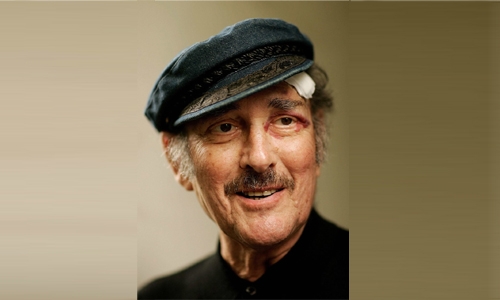Harold Pinter’s legacy — and terrifying relevancy
Ten years after Harold Pinter’s death, it almost feels as if we’re trapped in one of his furrowed-brow-inducing plays. What is real? What is untrue? Why is everyone so creepy and annoying? And how frighteningly relevant the works of that most curmudgeonly of British playwrights suddenly feel given the state of the world, as evidenced by a celebration here of the more obscure works of Sir Harold, who could turn family dysfunction into squirm-in-your-seat hysteria, and loneliness and despair into the worst nightmare of a theatre full of well-heeled couples.
All 20 of his one-acts, and a few poems and sketches thrown in to test your threshold for long and awkward pauses, are being performed through Feb 23 under the title “Pinter at the Pinter” at the quaint West End theater renamed in 2011 for the playwright, who died in December 2008. Recent matinee viewings of the first two groupings — five more are being rolled out through Feb 23 — reveal just how eerily applicable these pieces are to current news events and the general malaise that seems to have settled over the world.
Pinter Land, which some of us enjoy regularly visiting, is a rather rough place to hang out these days. But this isn’t just a case of art reflecting current political and humanitarian issues, which can be applied to virtually any era as history keeps repeating itself. How often do we get the “Shakespeare is so contemporary” routine — 400 years later, yes, people fall in love and tyrants are jerks. But these Pinter morsels are not just pertinent. They almost feel like cries of desperation from beyond the grave about humanity’s immediate future.
A case in point is “The Pres and an Officer,” which Pinter apparently scribbled down on a notepad shortly before his death and which his widow, Lady Antonia Fraser, discovered last year among her mementos. A mere six pages, it’s about a president obsessed with dropping a nuclear bomb on London (convinced it’s the capital of France). It almost feels like a before-I-die slap to President Donald Trump, yet written at the time when “The Apprentice” was as far as any of us ever imagined he would ascend.
As presented in its world premiere in the first batch of oneacts, “Pinter One” was hysterically funny but shockingly real — a spot-on depiction by a playwright who seemed to foretell the rise of a geographically challenged loose cannon of a president. Jon Culshaw plays the president as a Trump look-alike (perhaps too obvious a choice by the director Jamie Lloyd). Even creepier was “One for the Road,” with Antony Sher as a state functionary careering between charm and brutality as he interrogates three tortured members of a family.
But the truly skin-crawling offering was “The New World Order,” in which two tormentors crack jokes about their strategy as a trembling prisoner sits blindfolded, awaiting torture. “Pinter Three” and “Pinter Four” (opening this week and running through Dec 8 include such gems as the monologue “Tess,” performed by Penelope Wilton, for whom Pinter wrote the piece in 2002, and the London stage favourite Tamsin Greig in “Landscape,” as well as “A Kind of Alaska,” in which a woman awakens from a 29-year sleep (envious, anyone?).
“Moonlight,” which was one of Jason Robards’s final New York stage appearances, explores regret and loneliness from an elderly man’s deathbed. “Pinter Five” and “Pinter Six” (running mid-December through Jan. 26) features rarely performed works like “Family Voices” and “Party Time” and include the actors Martin Freeman and Jane Horrocks, and “Pinter Seven” (Jan 31 to Feb 23) pair “The Dumb Waiter” and “A Slight Ache,” two of Pinter’s better known one-acts. One highlight of the season thus far has been two benefit performances by the Oscar-winning actor Mark Rylance reciting the Nobel Prize acceptance speech that Pinter delivered in 2005, which is one of the most brilliant and bitter offerings on YouTube.
Pinter’s evisceration of George W Bush and Tony Blair for mixing truths and untruths during the Iraq War almost feels like gee-whiz acknowledgment of a more innocent time. Ah, to be back in the aughts (or whatever the heck we’re supposed to call that lost decade), when all we had to worry about was the Iraq war and little George and Tony. Thirteen years after Pinter’s videotaped speech from Britain (he was too ill to attend the Nobel ceremony in Stockholm) and 10 years after his death from cancer, it’s astonishing to watch his acceptance speech. He begins with the words he wrote in 1958: “There are no hard distinctions between what is real and what is unreal.
Nor between what is true and what is false.” Pinter clarifies that as an artist, he stands by his assertion. But as a citizen, he cannot. “Truth in drama is forever elusive. You never quite find it. But the search for it is compulsive,” he said. “The search is clearly what drives the endeavour. The search is your task.” With these words, and this ambitious staging of his shockingly relevant body of one-acts as 2018 nears its finale, the search for truth feels more immediate — and harder to grasp — than ever. It’s a clear indication that this fiendishly existential playwright’s works couldn’t be more fresh or timely Or more terrifying.
Related Posts

